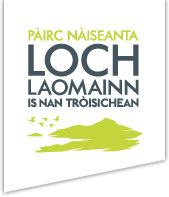
Lochs, glens & straths
Lochs
Loch Achray: Loch Àth Chrathaidh (aah CHRAHee) – ‘loch of the ford of shaking’
Loch Ard: Loch na h-Àirde (nuh HAARJuh) – ‘the loch of the height/ promontory’
Lake of Menteith: Often called ‘Scotland’s only lake’, it is nevertheless a ‘loch’ in Gaelic! Named for its island, it is Loch Innse Mo Cholmaig (eensh mo CHOLomik) – ‘the loch of St Colmag’s isle’
Loch Arklet: Loch Aircleid (ARKlaytch) – derived from airc-leathad ‘difficulty-slope’ (referring to a steep incline on the north side of the loch
Loch Chon: Loch Chon (CHON) – ‘loch of dogs’
Loch Dochart: Loch Dochart (DOCHart), from the river
Loch Doine: This has been explained as Loch Dubh-Aibhne (DOO eynyuh) ‘loch of the dark river’, but it is open to doubt
Loch Earn: Loch Èireann (AYran) – ‘loch of Ireland’ (presumably named by early Gaelic-speaking settlers)
Loch Eck: Loch Aic (ECHK) – a reduced form of Eachaig (EHuchik) ‘horse stream’, still found in the River Eachaig which drains the loch
Loch Goil: Loch Goill (GUH-eel) – ‘loch of the foreigner or stranger’, possibly referring to Norse settlers
Loch Iubhair (YOOur) – ‘yew loch’
Loch Katrine: Loch Ceiteirein (KAYTCHurin) – possibly ‘dusky loch’
Loch Lomond: Loch Laomainn (LOEUmin) – ‘beacon loch’ (named from the mountain)
Loch Long: Loch Long (LONGK) – ‘loch of ships’
Loch Lubnaig: Loch Lùdnaig (LOODnik) – obscure; the anglicised form suggests a name based on lùb ‘bend’, fitting the bent shape of the loch, but the Gaelic form would seem to rule that out
Loch Sloy: Loch Slòigh (SLÒY) – apparently ‘loch of the host/multitude’ but the reason for the name is unknown
Loch Venachar: Loch Bheannchair (VYANuchur) – ‘horn-shaped, i.e. tapering, loch’
Loch Voil: Loch Bheothail (VYOhil) – this has been explained as Loch a’ Bheò- Thuil, (uh VYOH hool) ‘loch of the quick-running flood’ but it is open to doubt
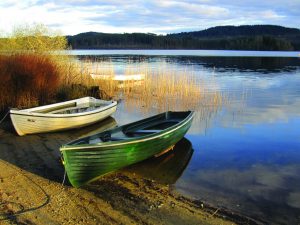 |
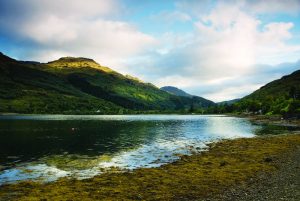 |
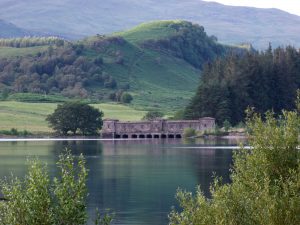 |
| Loch Ard | Loch Long | Loch Venacher |
Glens and Straths
Glen Ample: Gleann Ambail (AMPil) – ‘glen of the cauldron or vat’ (named for the Falls of Edinample)
Glen Croe: Gleann a’ Chròtha (uh CHRÒ-uh) – ‘the glen of the animal pen’
Glen Douglas: Gleann Dùbhghlais (DOOlish) – ‘glen of the dark stream’
Glen Falloch: Gleann Falach (FAL-uch) – often explained as ‘concealed glen’ but possibly ‘ring glen’ (although the reason for the name is unknown)
Glen Finart: Gleann Fhionnaird (YOONarsd) – ‘glen of the fair height’ (from Fionn Àird)
Glen Finglas (or Finlas): Gleann Fionnghlais (FYOONGlash) – ‘glen of the white stream’; birthplace of the Rev. James Stewart who, while minister at Killin, made the first translation of the New Testament into Gaelic (1767)
Glen Fruin: Gleann Freòin (FREH-oh-win) – the name may be inherited from the river and be based on freòine ‘rage’( the village of Balfron (balFRON), just outside the park, may derive its name from the same root); an alternative Gleann a’ Bhròin – ‘the glen of sadness’ – has been suggested, referring to a bloody battle between the MacGregors and the Colquhouns in 1603, but this is an example of folk etymology, where the imagination creates an explanation for a place name no longer readily understood by the populace
Glen Kinglas: Gleann Chonghlais (CHONGlish) – ‘glen of the dog stream’
Glen Luss: Gleann Luis (LOOSH) – ‘herb glen’
Glen Massan: Gleann Masain (MASSin) – Masan’s glen (personal name, famous in Gaelic tradition for its connections with the heroic legend of Deirdre); the 15th century Glenmasan Manuscript, a rich source of Scottish folklore and legend held in the National Library of Scotland, originated here
Glen Ogle: Gleann Ògail (ÒKil) – meaning obscure
Glenbranter: Gleann a’ Bhranndair (uh VROWNdir) – possibly from the river; ‘the glen of the gridiron’ would be a direct translation but the origin is obscure
Strathfillan: Na Srathaibh (nuh STRAH-hiv) – the English name commemorates St Fillan (echoing an older Gaelic name Srath Chill Fhaolain ‘the strath of Fillan’s church’); the modern Gaelic name means ‘the straths’
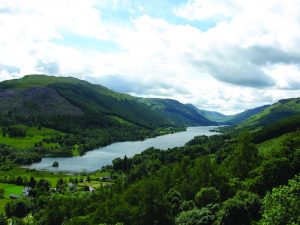 |
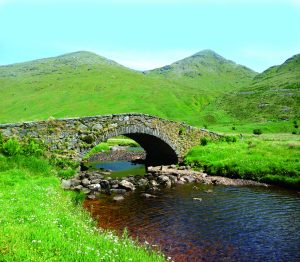 |
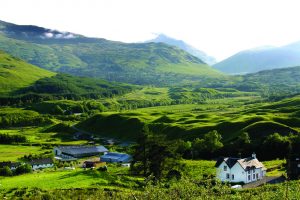 |
| Balquhidder Glen | Glen Kinglas | Strathfillan |

